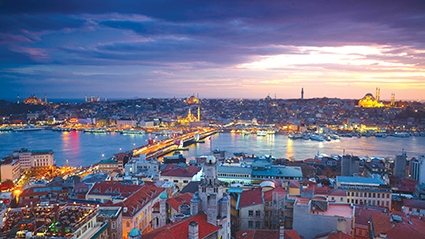After Syria, Russia Might Gain Momentum in Lebanon
Op-Ed
In previous editions of GT, I have written often on Russian geopolitical interests in Syria and how the country generally helped Bashar al-Assad to prop up his positions. Russia also increased its military presence in the country, recently receiving 49-year leases on an airbase and port facility in Syria.
Russian resurgence in the Middle East has, however, not only been limited to the Syrian conundrum. To be better positioned in Syria, Russian geopolitical imperatives are driving the country towards active diplomatic and military moves in Syria’s neighboring countries. One of the theaters of active Russian diplomacy has long been Lebanon. Russian media has at times given hints about Moscow’s rising interests in this Mediterranean state, reporting on the visits of Russian ships to Lebanese ports and spreading rumors that Russia would soon have a military presence there. Those leaks were partially corroborated when on February 3, the Kremlin directed the Ministry of Defense to sign an agreement with Lebanon on increased military cooperation. Moreover, the draft agreement also proposes the use of Lebanese facilities by the Russian military. Both sides also agreed on a broader exchange of military information and intensive bilateral cooperation against terrorism.
The draft agreement is quite extensive as it also involves the joint training of troops, information and engineering support, military education and medicine, military topography and hydrography. The agreement (if signed) will be for a period of five years with an automatic extension for a subsequent five-year period.
A Russo-Lebanese military agreement is notable and could actually signal a certain turn as Lebanon and its military have been traditionally oriented toward the West. Russo-Lebanese military contacts have been somewhat mixed in the past. For instance, although the Lebanese Armed Forces (LAF) possess Russian weapons such as tanks and rifles, in 2008 the LAF rejected Moscow's offer of ten free MiG-29 fighters. Indeed, to date, LAF’s equipment has been mostly American and European, including M60 and M48 tanks, M113 armored personnel carriers and TOW antitank missiles. Under the last two US administrations, according to various estimates, $357 million in arms was sent to Lebanon.
For Russia, Lebanon’s geographic position on the Mediterranean, along with those potential military facilities and the proximity to war-torn Syria, make it an attractive space in which to project its influence. For Lebanon, Russia has gradually turned into a potential guarantor of peace in Syria. For instance, following the proposed bilateral agreement between Russia and Lebanon, Nabih Berri, Speaker of the Lebanese Parliament, called upon Russia to resolve the crisis in Syria: “I want to turn to Russia, which, along with the United States, is a great power; we cannot ask this from the United States, but we ask Russia to help achieve a political settlement in Syria, which will be a major step toward the return of the Syrians to their homeland.”
Beyond a military significance, there is also an economic angle to increased Lebanese-Russian cooperation: Lebanon recently decided to begin exploiting its offshore Mediterranean natural gas reserves. The State also offered exploration tenders to its offshore seabed. Russian states companies (among them Novatek) have expressed interest in tapping into the Lebanese raw material resources, with the first exploratory to be drilled in 2019.
This maritime resource exploration by Lebanon has reignited disputes with Israel over their maritime frontiers. The Lebanese-Russian cooperation is expected to have an effect on Israel too, coming as it does amid Russia-Israel complications following the February 11 conduct of Israeli multiple airstrikes on Syrian-Iranian targets in Syria.
The Russian moves in Lebanon could potentially disturb the current status quo where the Kremlin is allowing Israel to continue carrying out preventive strikes on Syrian soil. The Russians need this least for the time being as, on a broader level, Russian efforts to maintain a dominant posture on the Syrian battlefield have been shaken. The Turkish operation in Afrin, in the north of the country, made clear that Moscow is unable to forestall the growth of Ankara’s influence. Iranian proxy forces are now close to the Israeli border, and Russia failed to accomplish anything significant in this regard at the Sochi Conference in late January. Moreover, Russian mercenaries were also killed by the hundreds, according to some reports, by US forces, diminishing Russian prestige in and around Syria.
Thus, while Russia and Lebanon are experiencing a definite uptick in economic and military relations, Russia will remain conscious that its position in Syria remains vulnerable and the least desirable thing would be Israel’s more robust engagement in Syria.
Emil Avdaliani












